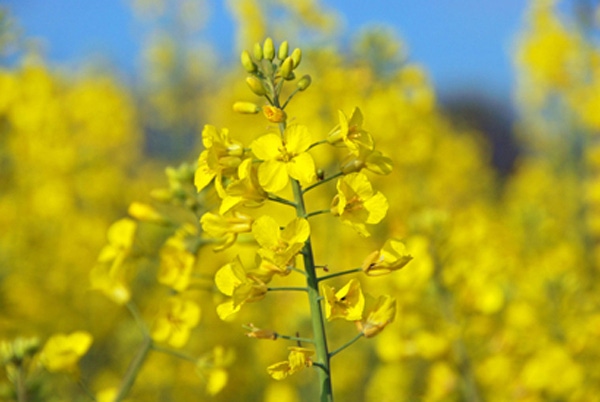April 5, 2011

Winter canola in the Southern Plains is growing well considering what the weather has done this year, says Heath Sanders, Producers Cooperative Oil Mill oilseed agronomist.
With more than 120,000 acres of the new crop maturing in North Texas, Oklahoma and Kansas, farmers know they need to watch their fields closely as canola begins a rapid transition from winter dormancy to ready-to-harvest, he said.
"Winter canola has fared pretty well for what Mother Nature has thrown at us so far," Sanders explained. "Extreme dry conditions exist in the southern part of the growing area while some rain has fallen in North Central Oklahoma."
Canola is starting to bolt and bloom in most parts of the Southern Plains, Sanders said. Canola still has the potential to recover and make a yield if a rain will come to the plains.
"Farmers and crop consultants should pay close attention to the presence of aphids in canola fields," Sanders said. "It is particularly important to check the canola buds while the crop is flowering and setting seed pods. They should be checking for diamondback moths in the crop as well."
Dry conditions create stress on the canola plants, making them more susceptible to other forms of stress including insect damage. "Insect damage will have a greater impact on the crop's ability to produce than dry weather," he said.
Sanders announced that another Canola U, a day-long symposium on how to grow winter canola successfully, will be held May 3, 2011, in Oklahoma City. Winter canola field tours, sponsored by the Oklahoma Oilseed Commission and Oklahoma State University, will be held across Oklahoma April 11-14, Sanders said. A winter canola field day will be held April 28, 2011, at Lahoma, Okla.
Before joining PCOM, Sanders worked with Dr. Tom Peeper, the OSU weed scientist whose research started recognition of winter canola as a money crop and a crop to rotate with winter wheat to reduce serious weed problems in continually-grown winter wheat in the Southern Plains.
Sanders' email address is [email protected]. His cell number is 580-678-2754. PCOM, the farmer-owned cooperative oilseed processor, has processed oilseed products in the Southwest and Mid-South for more than 60 years.
You May Also Like




